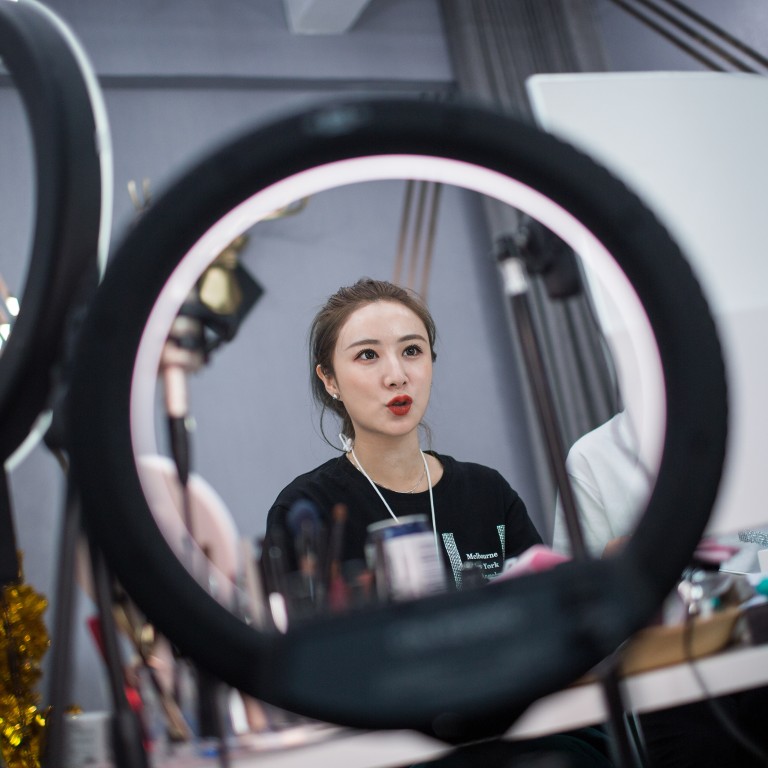
Unmerry Christmas for China’s live-streaming stars rushing to repay taxes after Viya incident
- E-commerce live-streamers across the country are rushing to report underpaid taxes after authorities dealt a record fine on top influencer Viya
- Recent cases showcase the government’s determination to crack down on tax avoidance – a common practice in the industry
Tax bureaus of 20 provinces and municipalities – including Beijing, Shanghai, Guangdong, Jiangsu and Zhejiang –are granting people in the same business as Viya a grace period to pay past-due taxes in return for lighter or waived penalties. Offenders who fail to report themselves by the end of the year risk heavy punishment, authorities said.
Since September, at least 1,000 e-commerce live-streamers have contacted tax authorities around the country to report additional taxes and plead for leniency, the official Xinhua news agency reported.
How Viya’s tax punishment is a wake-up call for live-streaming e-commerce
One influencer in Zhejiang province, who has been billing “tens of millions of yuan” of commission fees as corporate income instead of personal income, got in touch with the local tax authority to inquire about the amount she owes the day after Viya’s case came to light, said a business partner of the influencer, who declined to be identified.
China’s maximum tax rate on personal income is 45 per cent, compared to 25 per cent for corporate income. The system has led many influencers, such as Viya, to register multiple businesses to bill personal income as corporate revenues. Many also created shell companies in regions that offer tax holidays or low tax rates. In the case of Viya, she registered a few vehicles in Chongming, a Shanghai suburb that offers tax breaks.
Influencers with huge commission revenues often hire third-party agencies to deploy various strategies to keep their taxes low. Less famous live-streaming hosts, whose incomes are hard to tax because they consist mostly of tips from fans, often under-report their earnings.
Tax avoidance is almost universal in the country’s live-streaming business because authorities had largely turned a blind eye until recently, according to Zhang Xue, a tax accountant using a pseudonym, who helped small merchants with tax planning.
Tax crackdown looms for China’s top celebrities and online influencers
Chinese tax authorities did not officially endorse the tax avoidance practices that have sprung out of the tax system’s grey area, but neither did they investigate such behaviours before this fall’s clampdown.
Now that the government has deemed such operations to be illegal and punishable, however, live-streamers who fail to repay their taxes immediately could run afoul of criminal laws, experts said.
Many of the common practices adopted by China’s live-streaming stars are considered problematic because some shell entities were established with the sole aim of processing false transactions, said Cui Yanshuang, a Shanghai-based lawyer at Ricc & Co. “They focus on cutting [tax] payments, accumulating [legal] risks in the process.”
According to a statement issued by Viya’s husband Dong Haifeng, the rags-to-riches couple hired third-party agents for “tax planning and management” without realising they were breaking the law until last November.
Who is Viya, China’s fallen live-streaming e-commerce star?
According to the authority’s final ruling, Viya evaded and underpaid taxes totalling more than 700 million yuan (US$109 million) from 2019 to 2020. The violation brought her not only a fine of US$210 million – the largest ever levied on an individual in China for tax evasion – but also the immediate suspension of her e-commerce and social media accounts.
The harsh punishment, along with strongly-worded condemnations from state media outlets, sent a clear message that tax avoidance practices by people like Viya are both a regulatory offence and a political faux pas, at a time when Beijing is pushing forward its “common prosperity” campaign that aims to address social and income inequality.
In a country where the average wage in the private sector was less than 58,000 yuan in 2020 and where some 600 million people are still living on a monthly income of 1,000 yuan or less, any ostentatious display of wealth is bound to attract intense scrutiny, experts said.
Specifically, Viya was fined for declaring personal income as corporate revenue, and hiding her income from tax authorities. Part of the second offence cost her a fine of 109 million yuan, or four times the amount of taxes evaded, showing the level of outrage against her, said Li Chen, who works at the tax bureau of a city in the Yangtze River Delta – an area centred at Shanghai.
“It implies that Viya did not report her tax in full even after the regulator had started to question her wrongdoing,” Li said. In its statement, the Hangzhou tax authority said Viya did not complete the requested remedial measures despite many reminders from tax officials.
Under China’s law, the non-payment or underpayment of taxes is punishable by up to five times the amount of the owed taxes.
The punishment on Viya sent a signal that China’s scrutiny of celebrities, including live-streamers and film stars, will keep intensifying and laws will be implemented strictly, said Cheng Liang, a lawyer at SG & Co Lawyers in Shanghai.
Many Chinese social media users, appalled by the amount of wealth accumulated by Viya and her peers, applauded the tax campaign.
But others questioned the timing and severity of the penalties, including the suspension of Viya’s online accounts. “So if an airline is found guilty of tax evasion, would it be necessary to smash all of its planes?” one commentator wrote in an article on WeChat.
It is unclear whether Viya will be able to resume her live-streaming activities after paying all outstanding taxes and fines.
In China, there is little prospect for these punished influencers to appeal their cases to the court.
China’s online censors target influencers for not being good socialists
Recent developments underscore the power of China’s tax authorities, who are armed with sophisticated technologies to monitor the private financial transactions of individuals. The Hangzhou tax bureau said it spotted Viya’s tax issues through “big data taxation analysis”.
The use of new tools is a game-changer in the country, where nominal tax rates are high but enforcement was relatively lax.
According to the Ministry of Finance, China’s tax revenues in the first 11 months of 2021 increased 14 per cent from a year ago to 16 trillion yuan, with revenues from personal income tax surging 20 per cent to 1.3 trillion yuan. Tax revenues grew much faster than the overall economy and individual incomes, which have suffered under the prolonged Covid-19 pandemic.
Additional Reporting by Tracy Qu


